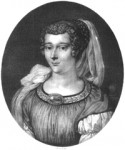- Marie le Jars de Gournay
by Koren Whipp
Marie le Jars de Gournay (1565-1645) French writer, editor, literary critic, translator, novelist, poet, and philosopher. She was born in Paris and raised in Gournay-sur-Aronde. Her father, Guillaume Le Jars was treasurer to King Henri III of France. In 1568 he obtained feudal rights to the Gournay estate in Picardy, and in 1573, after he purchased the Neufvy estate, he became Seigneur de Neufvy et de Gournay.[1] Gournay was self-taught in Latin and Greek, translating works by Ovid, Virgil, and Tacitus.[2] In addition to her many poems, literary compositions, and a book on the instruction of princes, she published one of the first psychological novels in France, Le Proumenoir de Monsieur de Montaigne (1594).[3]
When Gournay was about eighteen she read the recently published Essais de Michel de Montaigne which would shape the remainder of her life. She became so enthralled and excited in the book that her mother wanted to administer a sedative to calm her. [4] At twenty-two, while visiting their Paris home with her mother, Jeanne de Hacqueville, Gournay boldly wrote a letter of introduction to Montaigne asking if they could meet. They became close friends and he offered her the title “fille d’alliance” and thereafter she called him “père”. During the remainder of 1588 Montaigne visited Gournay both in Paris and Gournay-sur-Aronde. Their close friendship and mentorship is evident in the 1588 edition of the Essais in which additions are recorded in Gournay’s hand, suggesting her involvement as his editorial assistant. [5]
In 1594, Montaigne’s widow, François Léonore de La Chassaigne, sent Gournay one of the final drafts of the Essais to have them published. She was invited to visit the chateau of Montaigne in Bordeaux and spent about sixteen months, from 1595 through 1597, pouring over Montaigne’s vast library. Gournay wrote a long preface to the Abell Langellier edition of Montaigne’s Essais in 1595 (which was re-issued in subsequent editions 1617, 1625 and 1635). This preface was highly criticized for her strong support of Renaissance poets’ Latinising and Hellenistic endeavor to embellish and refine vernacular French, which seventeenth-century grammarians actively sought to undo.[6] At least ten more editions of the Essais would be published under her editorship, notably the 1617 edition which was the first to include translations of the Latin quotes and to designate the sources cited.[7]
Gournay never married and lived alone with a faithful maid and a cat in poverty her entire life.[8] Although her intellectual circle included some of the liveliest minds of Europe, she had detractors and they attacked her with the one weapon for which she had no defense: because she was a woman. They mocked her for wanting to keep a carriage, for entertaining, for keeping two maids, for owning three cats, for performing chemical experiments, for being learned, for being combative, for being plain, and later for being old.[9] Gournay answered these attacks with The Equality of Men and Women (1622) in which she uses her experiences as a female intellectual to argue that men have simply pronounced women to be inferior; The Ladies’ Complaint (1641), a bitter denunciation of men’s treatment of intellectual women; and The Apology for the Woman Writing (1641), in which Gournay excoriates those who stereotype the learned woman.
Marie de Gournay is now recognized as the first woman in France to contribute to literary criticism and one of the first to argue forcibly on the equality of men and women.[10] Her final collected works ran to nearly 1000 pages.
[1] C. Venesoen (ed.), Egalité des hommes et des femmes et Grief des dames, suivi du Promounoir de Monsieur de Montaigne (Genève: Droz, 1993), 27; and Séverine Genieys-Kirk, “Mary de Jars, Lady of Gournay,” Mary Hays, Female Biography; or, Memoirs of Illustrious and Celebrated Women, of All Ages and Countries (1803). Chawton House Library Series: Women’s Memoirs, ed. Gina Luria Walker, Memoirs of Women Writers Part II (Pickering & Chatto: London, 2013), vol. 8, 460-69, editorial notes, 615-21, on 616.
[2] Marie Le Jars de Gournay, Eds. and Trans. Hillman, Richard and Colette Quesnel. Apology for the Woman Writing and Other Works (Chicago: The University of Chicago Press), Intro., 6.
[3] Paul Bonnefon. Montaigne et ses amis (Paris, 1898), 325. Quoted in Marjorie Henry Ilsley, A Daughter of the Renaissance (The Hague: Mouton & Co. 1963), 50.
[4] Ilsley, A Daughter of the Renaissance, 21.
[5] Maryanne Cline Horowitz, “Marie de Gournay, Editor of the Essais of Michel de Montaigne: A Case-Study in Mentor-Protegee Friendship,” The Sixteenth Century Journal, Vol. 17, No. 3 (Autumn, 1986), 271-84, accessed: 04/11/11 11:21. www.jstor.org/stable/2540321
[6] Genieys-Kirk, “Mary de Jars, Lady of Gournay,” vol. 8, 460-69, editorial notes, 615-21.
[7] Horowitz, “Marie de Gournay, Editor of the Essais…” 271-84; and Eva Sartori, “Marie de Gournay,” Allegorica. Vol. IX, Winter 1987, Summer 1988 (The University of Texas at Arlington), 135-41.
[8] Marjorie Henry Ilsley, A Daughter of the Renaissance (The Hague: Mouton & Co. 196), 38.
[9] Sartori, “Marie de Gournay,” 135-41.
[10] Sartori, “Marie de Gournay,” 135-41.
Bibliography
Fraisse, Geneviève. Reason’s Muse: Sexual Difference and the Birth of Democracy. Chicago: University of Chicago Press. 1994.
Genieys-Kirk, Séverine. “Mary de Jars, Lady of Gournay.” Mary Hays, Female Biography; or, Memoirs of Illustrious and Celebrated Women, of All Ages and Countries (1803). Chawton House Library Series: Women’s Memoirs, ed. Gina Luria Walker, Memoirs of Women Writers Part II. Pickering & Chatto: London, 2013, vol. 8, 460-69, editorial notes, 615-21.
Gournay, Marie Le Jars de. Eds. and Trans. Hillman, Richard and Colette Quesnel. Apology for the Woman Writing and Other Works. Chicago: The University of Chicago Press.
Hays, Mary. “Mary de Jars, Lady of Gournay.” Female Biography; or, Memoirs of Illustrious and Celebrated Women of all Ages and Countries (6 volumes). London: R. Phillips, 1803, vol. 4, 458-67.
Horowitz, Maryanne Cline. “Marie de Gournay, Editor of the Essais of Michel de Montaigne: A Case-Study in Mentor-Protegee Friendship. The Sixteenth Century Journal, Vol. 17, No. 3 (Autumn, 1986), 271-84. Accessed: 04/11/11 11:21. www.jstor.org/stable/2540321.
Ilsley, Marjorie Henry. A Daughter of the Renaissance. The Hague: Mouton & Co. 1963.
“Interview with Professor Philippe Desan, University of Chicago”. The Montaigne Project. University of Chicago. Accessed: 10/10/11 16:59. www.fathom.com/feature/122610/index.html
O’Neill, Eileen. “Early Women Philosophers and the History of Philosophy”. Hypatia, Volume 20, Number 3, Summer 2005, 185-97.
Sartori, Eva. “Marie de Gournay”. Allegorica. Vol. IX, Winter 1987, Summer 1988. The University of Texas at Arlington, 135-41.
Resources:
Brooklyn Museum
Elizabeth A. Sackler Center for Feminist Art: The Dinner Party: Heritage Floor: Marie le Jars de Gournay
http://www.brooklynmuseum.org/eascfa/dinner_party/heritage_floor/marie_le_jars_de_gournay.php
Page citation
Koren Whipp. “Marie le Jars de Gournay.” Project Continua (October 27, 2013): Vol. 1, [date accessed], http://www.projectcontinua.org/marie-le-jars-de-gournay/
Tags: Age of Discovery, Baroque, Editors, End of Renaissance, Essayists, Europe, Novelists, Philosophers, Poets, Reformation, Translators


